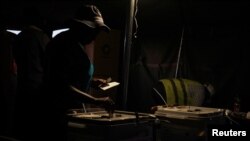In dozens of voting stations, voters braved long waits for ballot papers to be delivered, with some lining up all night.
The delays forced President Emmerson Mnangagwa, who is seeking a second term, to issue a late-night directive extending Wednesday's vote by another day.
Electoral commission spokesman Justin Manyau said voting was still underway in parts of the capital Harare and the eastern province of Manicaland.
"It's happening in selected wards," he said.
The commission's deputy chairman Rodney Kiwa said election authorities were still collecting information on when all wards would be finished.
"We are being very meticulous about this," he told AFP.
Thirty-nine local election observers were arrested in multiple raids Wednesday night with their computers and mobile phones seized, police said Thursday.
"These were coordinating the alleged release of election results by some civic organizations," police spokesman Paul Nyathi said.
Some were taken from an "election observation data center," according to a group of human rights lawyers.
"This is a blatant attempt by a desperate ruling party to block observers monitoring and broadcasting the truth of this election," spokesman for the Citizens Coalition for Change, CCC, opposition, Charles Kwaramba, said in a statement.
The poll is being watched across southern Africa as a test of support for the ZANU-PF party, whose 43-year rule has been battered by a moribund economy and charges of authoritarianism.
Less than a quarter of polling stations in Harare — an opposition stronghold — opened on time on Wednesday, according to electoral authorities, who blamed the problem on delays in printing ballot papers.
But Nelson Chamisa, head of the opposition CCC, was unconvinced.
"This is a clear case of voter suppression, a classic case of Stone Age, antiquated, analog rigging," he told a press conference.
Chamisa, 45, is the main challenger to Mnangagwa, 80, who came to power after a coup that deposed late ruler Robert Mugabe in 2017.
The CCC urged voters in affected areas to "remain vigilant and protect their vote."
"Resist any attempt by FAZ or imported voters to undermine the people's will," it said on social media, referring to a vigilante group reputedly aligned with the ZANU-PF.
Chaotic vote
In Glen Norah, a southwestern suburb of Harare, ballot papers only arrived around 0000 GMT — some 17 hours behind schedule.
On Thursday morning, voters returned to a school used as polling station.
"We waited for the whole day," said Lawrence Dzukutu, 52, a vendor who had come back to cast his ballot, having spent 16 hours outside the school gates on Wednesday.
"It's so disgracing because we thought we should have finished this process yesterday. Some of us were supposed to go to work but are now being deprived of going to work."
Empty bottles of water and juice were scattered outside the turquoise perimeter wall, remnants of the fruitless hours people had spent queueing there the day before.
Still, while frustrated many were upbeat and determined the election would still go their way.
Tafadzwa Chipfuva, a doctor aged 43, said he was "disappointed" but confident his vote would matter.
"It has to count, that's why I am here," he said.
Analysts described the vote as arguably the most chaotic in Zimbabwe's history.
The confusion was "unprecedented," said Sara Dorman, a specialist at Scotland's University of Edinburgh.
"It is quite hard to understand how a country can run elections regularly since independence and then have such a chaotic election day."
Dorman said she was reminded of elections in 2008, when a strong showing from the opposition was followed by a wave of political violence and repression.
"It is very noticeable that the polling stations that were lacking in ballots were all in areas that are considered opposition strongholds," she told AFP.

Forum